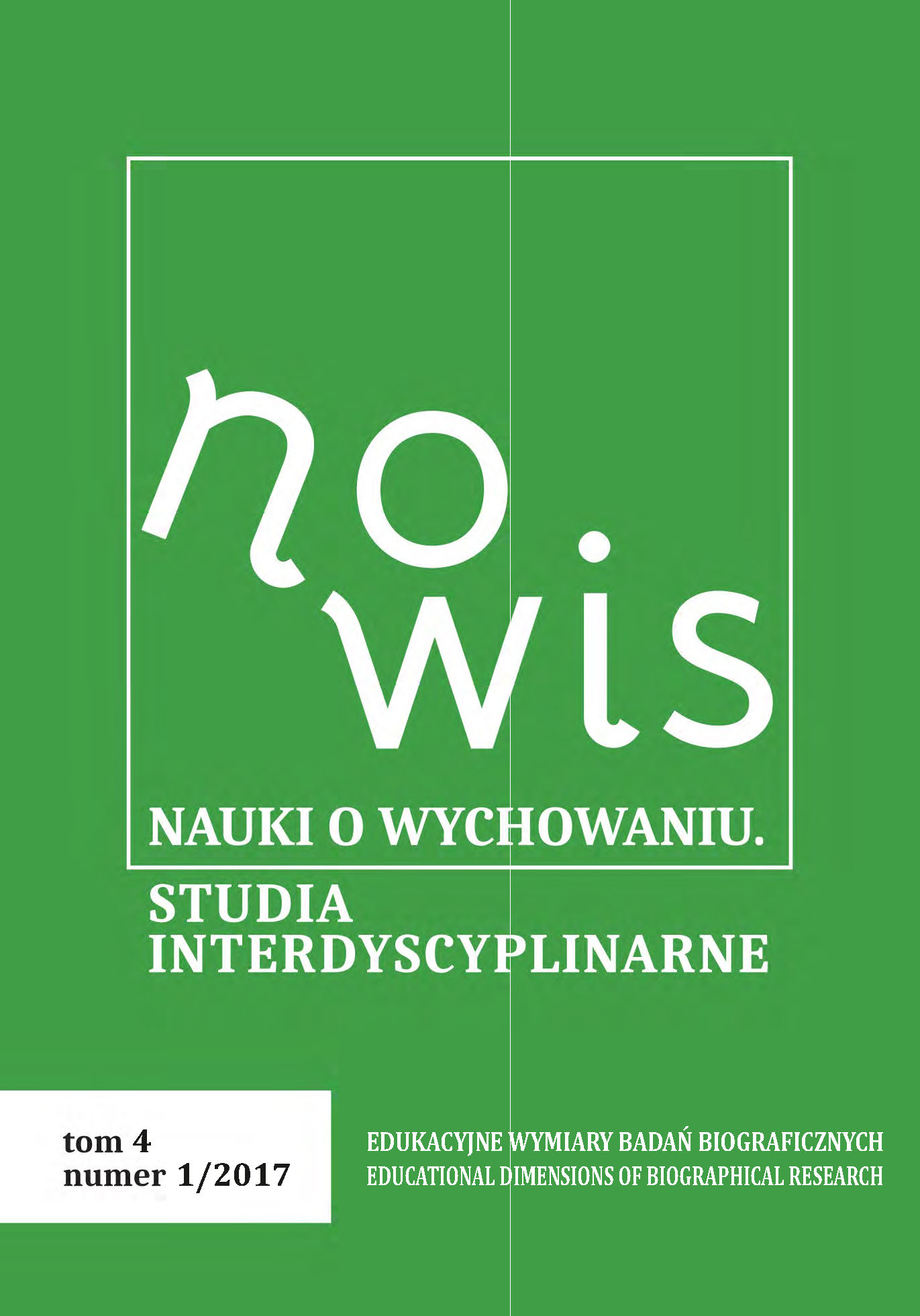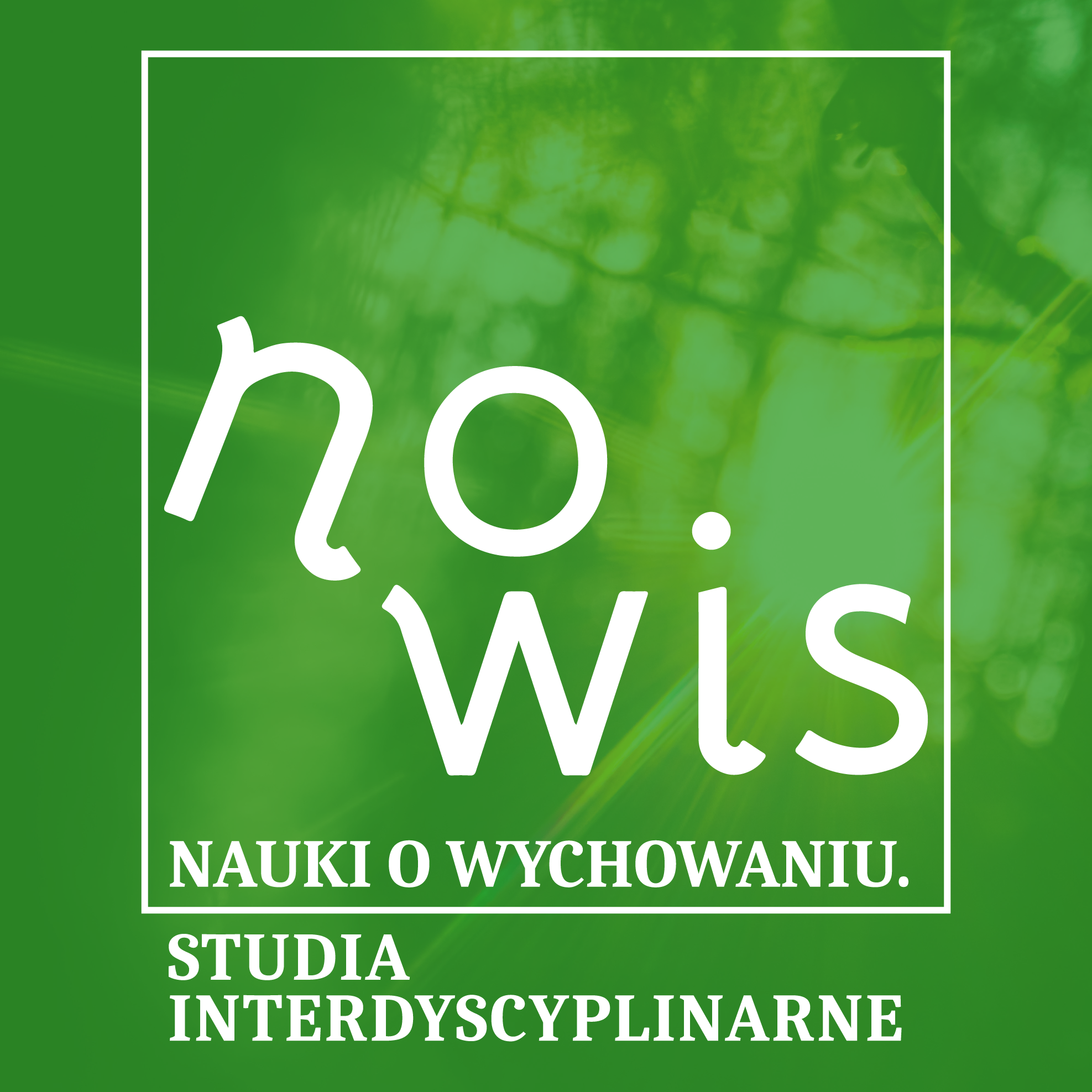Narracyjne uczenie się człowieka dorosłego. Założenia teoretyczne
DOI :
https://doi.org/10.18778/2450-4491.04.07Mots-clés :
narracja, narracja (auto)biograficzna, badania biograficzne, teoria narracyjnego uczenia się, narracyjne uczenie sięRésumé
W tekście przedstawiono zarys teorii narracyjnego uczenia się opracowanej przez M. Carolyn Clark i Marshę Rossiter. Teoria oparta jest na założeniu, że ludzie rozumieją nie tylko siebie, ale także zmiany zachodzące w biegu ich życia w sposób narracyjny. Narracje są unikalnym sposobem nadawania znaczenia doświadczeniom życiowym. W ujęciu autorek narracyjne uczenie się stanowi ramę do rozważań w dwojakim sensie: 1) uczenie się poprzez historie (tj. słuchanie historii, opowiadanie historii i rozpoznawanie historii), 2) konceptualizacja uczenia się jako procesu narracyjnego.
Références
Becker G. (1997) Disrupted Lives: How People Create Meaning in a Chaotic World, Berkeley and Los Angeles, University of California Press.
View in Google Scholar
Bruner J. (1990) Acts of meaning, London, Harvard University Press.
View in Google Scholar
Bruner J. (2004) Life as Narrative, „Social Research”, vol. 71, no 3, s. 691–710.
View in Google Scholar
Clark C. M. (2010) Narrative Learning: Its Contours and Its Possibilities, “New Directions For Adult & Continuing Education”, no 126, Special Issue “Narrative Perspectives on Adult Education”, s. 3–11.
View in Google Scholar
Clark C. M., Rossiter M. (2008) Narrative Learning in Adulthood, “New Directions for Adult & Continuing Education”, no 119, s. 61–70.
View in Google Scholar
Couser G. T. (1997) Recovering Bodies. Illness, Disability, and Life Writing, Madison, The University of Wisconsin Press.
View in Google Scholar
Czerniawska O. (2004) Od badań biograficznych do dydaktyki biograficznej, „Edukacja Dorosłych”, nr 3.
View in Google Scholar
de Medeiros K. (2014) Narrative Gerontology in Research and Practice, New York, Springer Publishing Company.
View in Google Scholar
Dryll E. (2004) Homo narrans – wprowadzenie w: Narracja. Koncepcje i badania psychologiczne, E. Dryll, A. Cierpka (red.), Warszawa, Wydawnictwo Instytutu Psychologii PAN, s. 7–20.
View in Google Scholar
Dryll E. (2014) Narracje rodzinne w: Psychologia rodziny, I Janicka, H. Liberska (red.), Warszawa, Wydawnictwo Naukowe PWN, s. 76–93.
View in Google Scholar
Dryll E., Cierpka A. (2011) Zagadnienia teoretyczne nurtujące polską psychologię narracyjną. Wprowadzenie w: Psychologia narracyjna. Tożsamość, dialogowość, pogranicza, E. Dryll, A. Cierpka (red.), Warszawa, Wydawnictwo Eneteia.
View in Google Scholar
Dubas E. (2011) „Uczenie się z (własnej) biografii” – wprowadzenie w: Biografia i badanie biografii, t. 1, Uczenie się z (własnej) biografii, E. Dubas, W. Świtalski (red.), Łódź, Wydawnictwo Uniwersytetu Łódzkiego, s. 5–9.
View in Google Scholar
Dubas E. (2014) Czas, biografia i badania biograficzne – różnorodność kontekstów w andragogicznej perspektywie, Edukacja Dorosłych, Nr 2 (71), s. 13–27.
View in Google Scholar
Frank A. W. (1995) The wounded storyteller. Body, illness, and ethics, Chicago–London, The University of Chicago Press.
View in Google Scholar
Garro L., Mattingly Ch. (2000) Narrative as Construct and Construction w: Narrative and the Cultural Construction of Illness and Healing, Ch. Mattingly, L. Garro (red.), Berkeley and Los Angeles, University of California Press.
View in Google Scholar
Golonka-Legut J. (2012) Indywidualne doświadczenie życiowe obszarem uczenia się człowieka dorosłego w: Kultura jako przestrzeń edukacyjna. Współczesne obszary uczenia się osób dorosłych, W. Jakubowski (red.), Kraków, Oficyna Wydawnicza „Impuls”, s. 45–62.
View in Google Scholar
Hawkins A. (1999) Pathography: patient narratives of illness, “Culture and Medicine”, no 171, s. 127–129.
View in Google Scholar
Jurgiel-Aleksander A. (2015) Jaka edukacja i dla kogo? Biografie edukacyjne dorosłych i ich społeczny wymiar, „Rocznik Andragogiczny”, s. 79–100.
View in Google Scholar
Karpiak I. (2000) Writing Our Life: Adult Learning and Teaching Through Autobiography, “Canadian Journal of University Continuing Education”, vol. 26, no 1, s. 31–50.
View in Google Scholar
Knowles M. (1980) The Modern Practice of Adult Education. From Pedagogy to Andragogy, wyd. 2, Englewood Cliffs: Prentice Hall Regents/Cambridge.
View in Google Scholar
Mazurek E. (2015) Illness Narratives – Between Personal Experience, Medical Discourse, and Cultural Practice, “Croatian Review of Rehabilitation Research”, vol. 51, no 1, s. 48–58.
View in Google Scholar
Mazurek E. (2017) Biograficzne uczenie się i narracyjne uczenie się – ramy teoretyczne, „Edukacja Dorosłych”, nr 1(76), s. 51–65.
View in Google Scholar
Maruszewski T. (2005) Pamięć autobiograficzna, Gdańsk, Gdańskie Wydawnictwo Psychologiczne.
View in Google Scholar
Nowak-Dziemianowicz M. (2014) Narracja w pedagogice – znaczenie, badania, interpretacje, „Kultura i Edukacja”, nr 2 (102), s. 7–44.
View in Google Scholar
Nowak-Dziemianowicz M. (2016) Walka o uznanie w narracjach. Jednostka i wspólnota w procesie poszukiwania tożsamości, Wrocław, Wydawnictwo Naukowe DSW.
View in Google Scholar
Polkinghorne D. E. (1988) Narrative Knowing and the Human Sciences, SUNY Press.
View in Google Scholar
Ricoeur P. (1992) Filozofia osoby, tłum. M. Frankiewicz, Kraków, Wydawnictwo Naukowe Papieskiej Akademii Teologicznej.
View in Google Scholar
Riessman C. K. (2002) Illness Narratives: Positioned Identities, Invited annual lecture, Health Communication Research Centre, Cardiff University, Wales.
View in Google Scholar
Riessman C. K. (2005) Narrative Analysis w: Narrative, Memory & Everyday Life, N. Kelly, Ch. Horrocks, K. Milnes, B. Roberts, D. Robinson (red.), Huddersfield, University of Huddersfield, s. 1–7.
View in Google Scholar
Riessman C. K. (2008) Narrative Methods for the Human Sciences, Thousand Oaks, California: Sage.
View in Google Scholar
Rosenthal G. (1993) Reconstruction of Life Stories: principles of selection in generating stories for narrative biographical interviews, “The Narrative Study of Lives”, no 1 (1), s. 59–91.
View in Google Scholar
Rosenthal G. (2003) The Healing Effects of Storytelling: On the Conditions of Curative Storytelling in the Context of Research and Counseling, “Qualitative Inquiry”, vol. 9, no 6, s. 915–933.
View in Google Scholar
Rossiter M. (2002) Narrative and Stories in Adult Teaching and Learning, „ERIC Digest”, No. 241.
View in Google Scholar
Skibińska E. (2009) Dydaktyka biograficzna: nowy obszar poznawczy andragogiki czy nowa utopia?, „Teraźniejszość – Człowiek – Edukacja”, nr 2 (46), s. 51–70.
View in Google Scholar
Tedder M., Biesta G. (2009) Uczenie się bez nauczania? Potencjał i ograniczenia biograficznego uczenia się dorosłych, „Teraźniejszość – Człowiek – Edukacja”, nr 2 (46), s. 19–35.
View in Google Scholar
Tembeck T. (2009) Performative Autopathographies: Self-Representations of Physical Illness in Contemporary Art, Montreal, McGill University.
View in Google Scholar
Trzebiński J. (2001) Narracja jako sposób rozumienia świata w: Praktyki opowiadania, B. Owczarek, Z. Mitosek, W. Grajewski (red.), Kraków, Wydawnictwo Universitas, s. 87–126.
View in Google Scholar
Urbaniak-Zając D. (2011) Biograficzna perspektywa badawcza w: Biografia i badanie biografii, t. 1, Uczenie się z (własnej) biografii, E. Dubas, W. Świtalski (red.), Łódź, Wydawnictwo Uniwersytetu Łódzkiego, s. 11–27.
View in Google Scholar
van Langenhove L., Hareé R. (1993) Positioning and Autobiography. Telling Your Life w: Discourse and Lifespan Identity, N. Coupland, J. F. Nussbaum (red.), London, Sage Publications, s. 81–99.
View in Google Scholar
Téléchargements
Publiée
Comment citer
Numéro
Rubrique
Licence

Ce travail est disponible sous licence Creative Commons Attribution - Pas d'Utilisation Commerciale - Pas de Modification 4.0 International.





 Le site web de la revue, hébergé par l'équipe éditoriale de NOWIS se trouve sur la plate-forme Index Copernicus:
Le site web de la revue, hébergé par l'équipe éditoriale de NOWIS se trouve sur la plate-forme Index Copernicus: 





